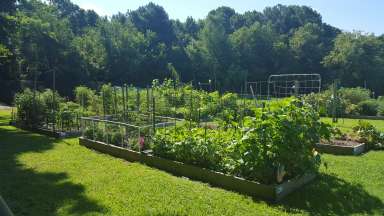The presence of community gardens and agriculture in the urban environment has a positive impact on the natural environment, the local economy, social relations, and household economic behavior, all of which contribute to sustainability and livability in Raleigh.
Interested in starting a Community Garden?
More details about the process and zoning regulations can be found on our Planning and Development How to Start a Community Garden page.
| Definition | Community gardens are defined as areas of land managed and maintained by a group of individuals to grow and harvest food crops and non-food ornamental crops, for personal or group use, consumption, sale, or donation. They may be divided into separate plots for cultivation by one or more individuals or may be farmed collectively by members of the group and may include common areas maintained and used by the group. |
|---|---|
| Approval | Community gardens on private land in the appropriate zoning districts are allowed. See Zoning below. |
| Size | The size of a community garden is governed by the underlying zoning district. See Unified Development Ordinance (UDO), Article 3.2 – Base Dimensional Standards. |
| Zoning | Community gardens are allowed as a principal use of a property in all Residential or Mixed-Use zoning districts, although they may be subject to certain conditional or special use approvals. Details are listed in the Unified Development Ordinance, Section 6.1.4 (Allowed Principal Use Table) and 6.6.1.B. (Community Gardens). A site's zoning may be checked on the Citywide Zoning Map (iMaps interactive mapping program). |
| On-site Sales | Produce shall be grown primarily for personal or shared use or donation. The on-site sale of agricultural produce at a Community Garden is permitted subject to the regulations in Unified Development Ordinance (UDO) Section 6.6.1.B.2, as amended by UDO text change TC-14-20 (Community Gardens with On-Site Sales). |
| Approval Process for On-site Sales |
|
| Accessory Structures | Detached accessory structures, such as storage or utility buildings, gazebos, trellises, or accessory greenhouse structures, are allowed, subject to issuance of a building and/or zoning permit. During the permit application review process, compliance with the requirements of the zoning district and the North Carolina Building Code will be evaluated. Structures and/or site uses related to creating a garden must meet applicable standards of the City code (e.g., shed size/placement, site maintenance, etc.). All necessary building/zoning permits must be obtained prior to construction. Contact Planning and Development for more information on required permits, fees and site plan regulations.
For more information reference UDO Article 6.7. |
| Animals | The raising of animals is not allowed in Residential Districts. In all other permitted districts, chickens are allowed at rate of 1 chicken per 1,000 square feet of lot area not to exceed 10 chickens on any single lot. No roosters are allowed. Housing for chickens must be able to be placed at least 25 feet from property lines. |
| Beehives | The raising of animal is not allowed in any Residential District. In all other permitted districts, a maximum of 2 beehives could be allowed at least 25 feet from any property lines. |
| Other Items to Consider | Soil: Consider having your soil tested. Contact Wake County Cooperative Extension about having a soil test run. You should also consider whether the soil may be contaminated. Sun: Ensure that the site is not shaded by nearby buildings or trees. An open south-facing space is best because vegetables need at least 6 to 8 hours of sunlight per day. Shade in a small area can be beneficial for creating a shade garden and a comfortable seating area. Access: Make sure the community garden is accessible to the street and sidewalk. Slope: Slope is an extra challenge and may make it difficult for people with mobility challenges. Flat lots are usually preferable, but home gardeners may find it advantageous to build raised beds so they can control the slope. Water: Verify that there is access to piped water at the site. Wise water management is a basic tenet of community gardening. It can be expensive to install a water line and water meter. You may wish to consider applying to help manage and re-use stormwater through the Raleigh Rainwater Rewards Program. Rainwater captured through rain barrels or cisterns, for example, can be a great way to reduce the excess runoff from your property as well as provide a source of water for beneficial landscaping. |
